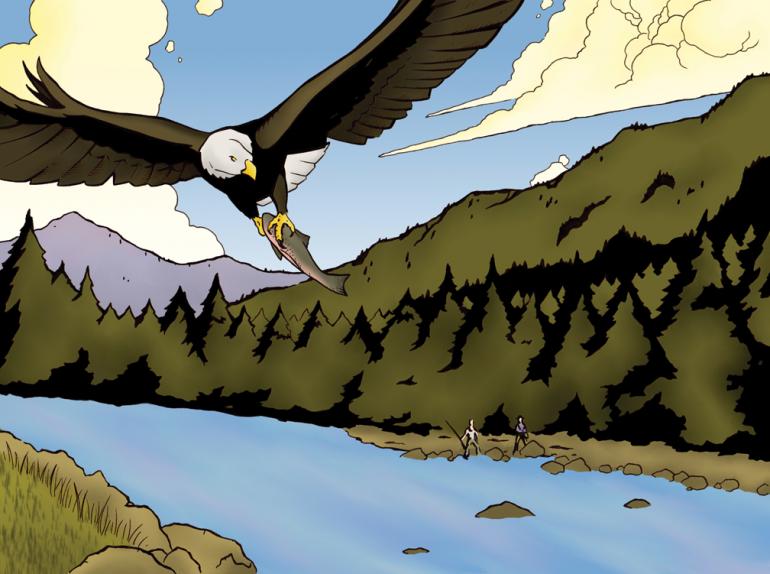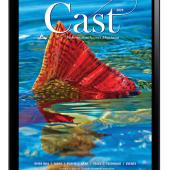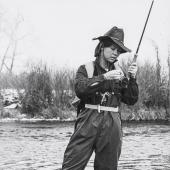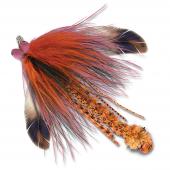Dead Fish Rising
While hiking along a high bank beside the Gallatin River one day and visualizing my stretch of water for the morning, I was startled by the insistent call of a fisherman down below. “Hey, you there!” he yelled. “You have a creel? I think this fish is going to die!”
Resisting my initial impulse to throw a rock at him, I scrambled down the bank to where his fish—a crimson-cheeked 16-inch rainbow—was languishing in the slack water close to shore. I selected a stout stick of the proper weight and diameter, cradled the moribund trout in my left hand, and whacked it twice on top of its head just behind the eyes to put it out of its misery.
I sat on a rock as he made his way to the bank, reeling up his slack line.
“Thanks!” He said with a big grin.
“Well,” I replied, “I don’t know that I really did you a favor, because now you have a dead fish.” I politely explained to him that having a basket slung from my shoulder did not make me the Dead Fish Collector. He told me that this was the first fish he had seen expire, even though he had “caught the lights out of the trout” since coming to Montana.
Unable to resist, I gave him a brief lecture on how, when a fish is played too long its levels of plasma cortisol and lactate become dangerously elevated and can have fatal consequences even after the fish is released. I pointed out that, without his knowing it, a surprising number of his last 100 fish had died an ugly death somewhere downstream.
Judging from his reluctance to approach the dead fish, which now bobbed gently against a rock, and from his immaculate ExOfficio shirt and high-end vest, I concluded he was probably not a fish-eater. There were no blood-stains on his waders.
“Look, why not just keep this one fish since you'll be taking a couple home anyway?” he asked, hoping to end this awkward, unwelcome situation. The dead rainbow was a spawned-out female that had spent all her energy producing eggs and had no meat left on her flanks.
“I can’t fillet any meat worth eating from that fish, so you’re stuck with it,” I said with a mischievous twinkle in my eye, resisting the temptation to suggest he just stuff it into the back pouch of his spiffy vest.
I fully intended to let him off the hook—so to speak—because he seemed to be an earnest, decent young fellow. However, as I was about to retrieve the hapless fish, wish him well, and be on my way, I noticed two eagles riding the early thermals. I tossed the dead fish into the middle of a run that tailed off into a riffle that cut a sparkling diagonal across the river a hundred yards downstream. We watched until we almost lost sight of it in the bright highlights of the water.
About then, one of the eagles adjusted the direction of its glide and dropped in low, parallel to the river. It feathered the tips of its wings, dipped its talons forward, seized the fish, leaned against its weight, and rose into the blue horizon above the trees with the rainbow in its grasp. It left a twinkling of sunlit droplets to mark its passage and rendered us speechless.
It was a magic moment because there is a natural, special kinship between eagles and fly fishers—especially those of us who keep an occasional fish to eat. This final act of consumption binds us to the drama of life and death implicit in that graceful dance between predator and prey. I sometimes dream I am an eagle gracefully dropping out of the sky to touch the shadow of a fish. I think my dream represents my subconscious desire to compensate for my ungainly, earthbound, rock-stumbling quest for rising trout.
I have drifted fish on the current for eagles before, and only twice have I seen one taken, so this was indeed an exceptional experience to share. I was as surprised and delighted as that pleasant young man from the Midwest with whom I shared the moment. I never saw him again, but I'm sure he will have a tall tale to tell to his friends about the fish-eaters he met in Montana.













